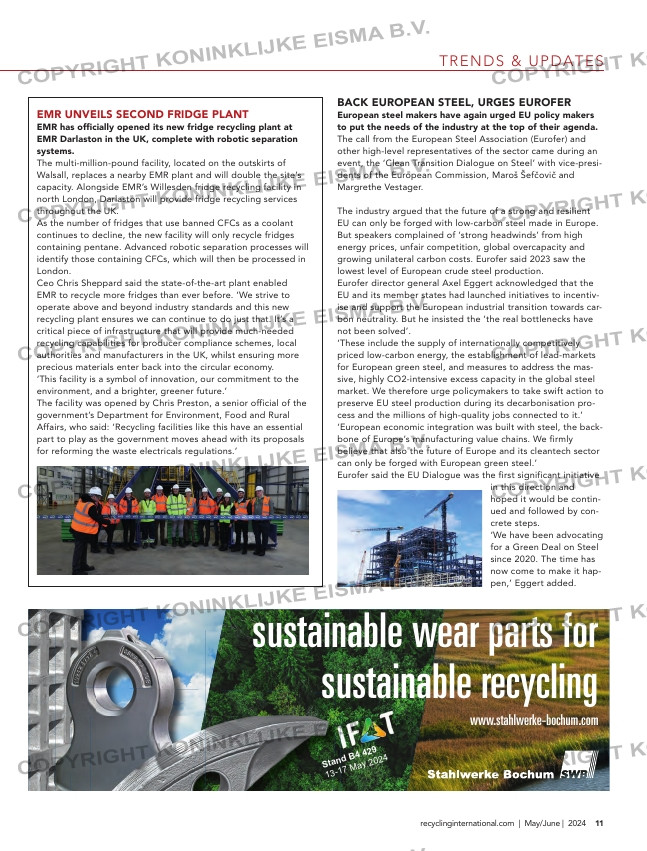Page 11 from: What’s inside?

TRENDS & UPDATES
11recyclinginternational.com | May/June | 2024
Fotobijschrift
EMR UNVEILS SECOND FRIDGE PLANT
EMR has officially opened its new fridge recycling plant at
EMR Darlaston in the UK, complete with robotic separation
systems.
The multi-million-pound facility, located on the outskirts of
Walsall, replaces a nearby EMR plant and will double the site’s
capacity. Alongside EMR’s Willesden fridge recycling facility in
north London, Darlaston will provide fridge recycling services
throughout the UK.
As the number of fridges that use banned CFCs as a coolant
continues to decline, the new facility will only recycle fridges
containing pentane. Advanced robotic separation processes will
identify those containing CFCs, which will then be processed in
London.
Ceo Chris Sheppard said the state-of-the-art plant enabled
EMR to recycle more fridges than ever before. ‘We strive to
operate above and beyond industry standards and this new
recycling plant ensures we can continue to do just that. It’s a
critical piece of infrastructure that will provide much-needed
recycling capabilities for producer compliance schemes, local
authorities and manufacturers in the UK, whilst ensuring more
precious materials enter back into the circular economy.
‘This facility is a symbol of innovation, our commitment to the
environment, and a brighter, greener future.’
The facility was opened by Chris Preston, a senior official of the
government’s Department for Environment, Food and Rural
Affairs, who said: ‘Recycling facilities like this have an essential
part to play as the government moves ahead with its proposals
for reforming the waste electricals regulations.’
sustainable wear parts for
sustainable recycling
www.stahlwerke-bochum.com
Stand
B4 4
29
13-17
May
2024
BACK EUROPEAN STEEL, URGES EUROFER
European steel makers have again urged EU policy makers
to put the needs of the industry at the top of their agenda.
The call from the European Steel Association (Eurofer) and
other high-level representatives of the sector came during an
event, the ‘Clean Transition Dialogue on Steel’ with vice-presi-
dents of the European Commission, Maroš Šefčovič and
Margrethe Vestager.
The industry argued that the future of a strong and resilient
EU can only be forged with low-carbon steel made in Europe.
But speakers complained of ‘strong headwinds’ from high
energy prices, unfair competition, global overcapacity and
growing unilateral carbon costs. Eurofer said 2023 saw the
lowest level of European crude steel production.
Eurofer director general Axel Eggert acknowledged that the
EU and its member states had launched initiatives to incentiv-
ise and support the European industrial transition towards car-
bon neutrality. But he insisted the ‘the real bottlenecks have
not been solved’.
‘These include the supply of internationally competitively
priced low-carbon energy, the establishment of lead-markets
for European green steel, and measures to address the mas-
sive, highly CO2-intensive excess capacity in the global steel
market. We therefore urge policymakers to take swift action to
preserve EU steel production during its decarbonisation pro-
cess and the millions of high-quality jobs connected to it.’
‘European economic integration was built with steel, the back-
bone of Europe’s manufacturing value chains. We firmly
believe that also the future of Europe and its cleantech sector
can only be forged with European green steel.’
Eurofer said the EU Dialogue was the first significant initiative
in this direction and
hoped it would be contin-
ued and followed by con-
crete steps.
‘We have been advocating
for a Green Deal on Steel
since 2020. The time has
now come to make it hap-
pen,’ Eggert added.
10-11-12-13-14-15_trendsupdatesi.indd 11 25-04-2024 09:36



